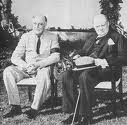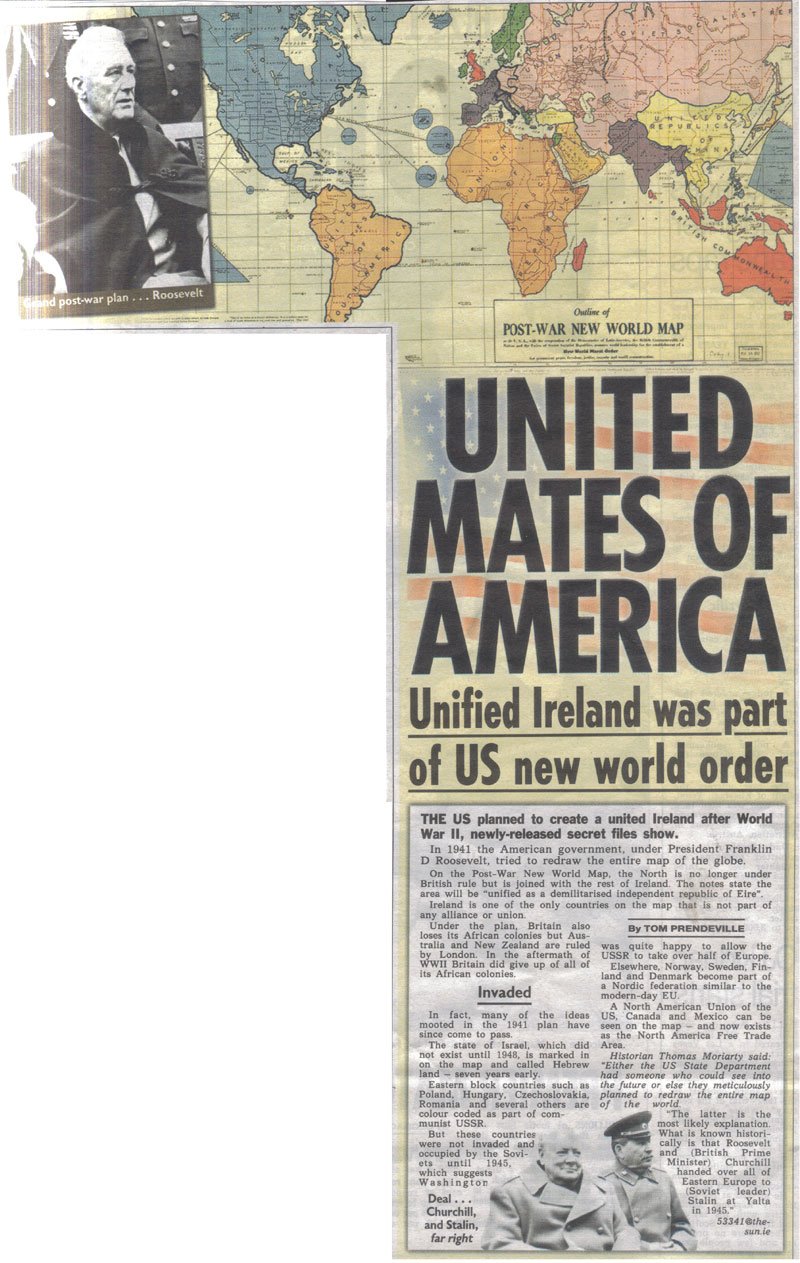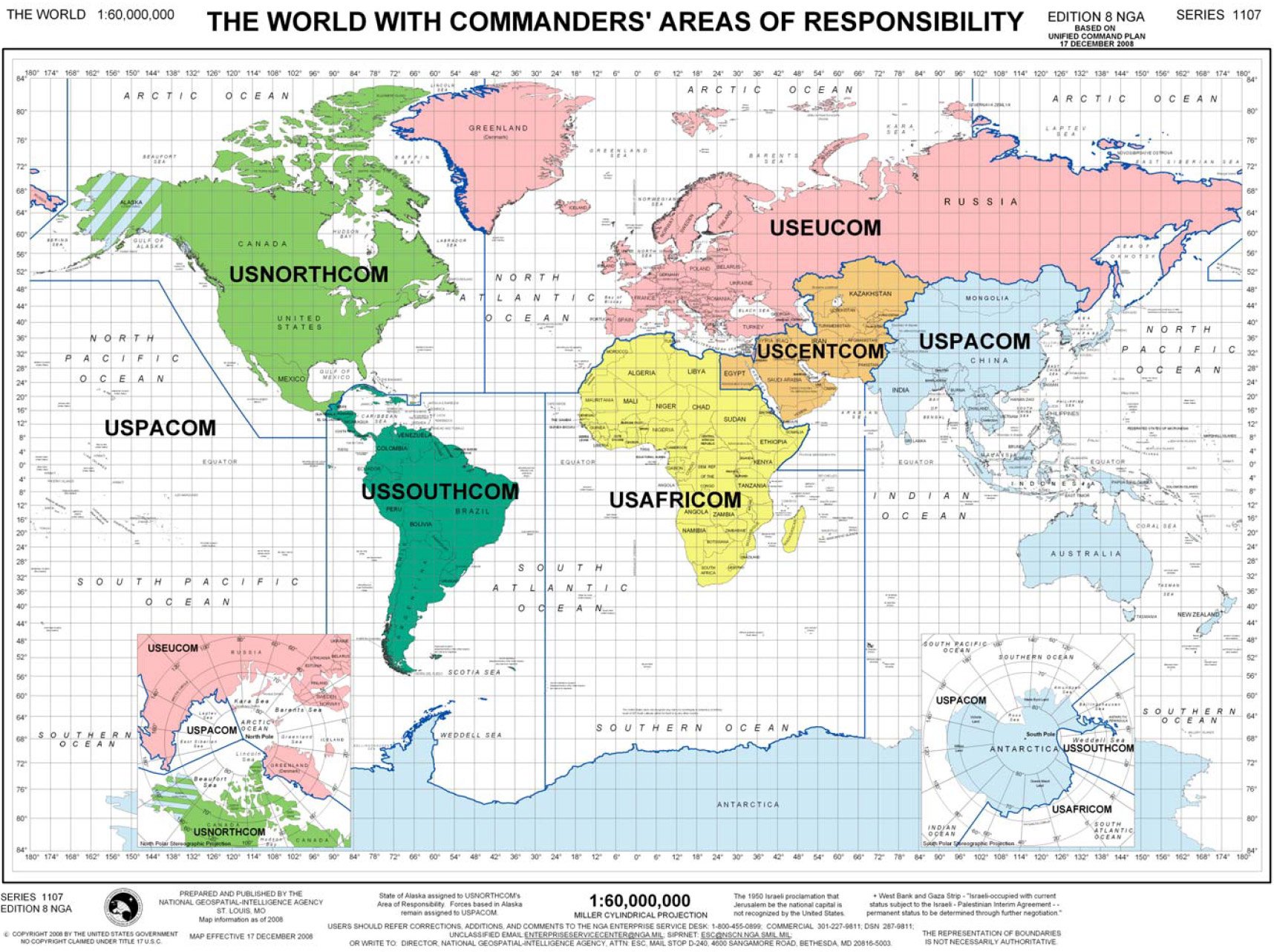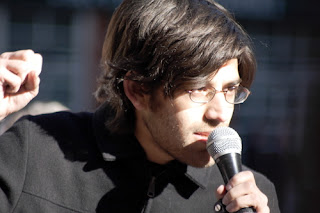
Back in 1992 the Pentagon’s Joint Chiefs of Staff held a “Strategy Essay Competition.”
The winner was a National War College student paper entitled, “The Origins of the American Military Coup of 2012.” Authored by Colonel Charles J. Dunlap, Jr. the paper is a well documented, “darkly imagined excursion into the future.”
The ostensibly fictional work is written from the perspective of an imprisoned senior military officer about to be executed for opposing the military takeover of America, a coup accomplished through “legal” means. The essay makes the point that the coup was “the outgrowth of trends visible as far back as 1992,” including “the massive diversion of military forces to civilian uses,” particularly law enforcement.
http://www.carlisle.army.mil/USAWC/Parameters/Articles/1992/1992%20dunlap.pdf
Dunlap cites what he considered a dangerous precedent, the 1981 Military Cooperation with Civilian Law Enforcement Agencies Act, an act that sanctioned US military engagement with law enforcement in domestic “support operations,” including “civil disturbance” operations. The act codified the lawful status and use of military “assets” in domestic police work.
http://www.law.cornell.edu/uscode/text/10/subtitle-A/part-I/chapter-18
Encroachment upon Basic Freedoms
Since that time the American people have been subject to a series of deeper and deeper encroachments upon our basic freedoms, increasingly extensive deployment of military operations on the home front, perpetrated by a corporate driven military mission creep that now claims the right and duty to arrest and detain us on the word of a Pentagon or White House operative. President Obama’s signing of the 2012 National Defense Authorization Act (NDAA) whose Section 1021 sanctions the military detention of American citizens without charge, essentially aims to put the last nail in the coffin of our Constitution, our teetering Republic and our most basic democratic traditions.
The statute contains a sweeping worldwide indefinite detention provision. While President Obama issued a signing statement saying he had “serious reservations” about the provisions, the statement only applies to how his administration (“you can trust me”) would use the authorities granted by the NDAA, and would not affect how the law is interpreted by subsequent administrations. The White House had threatened to veto an earlier version of the NDAA, but reversed course (of course) shortly before Congress voted on the final bill, which the President signed on the 31st of December 2011, a day that will go down in infamy.
“President Obama’s action today is a blight on his legacy because he will forever be known as the president who signed indefinite detention without charge or trial into law,” said Anthony D. Romero, ACLU executive director. “The statute is particularly dangerous because it has no temporal or geographic limitations, and can be used by this and future presidents to militarily detain people captured far from any battlefield.” According to Senator Dianne Feinstein. “Congress is essentially authorizing the indefinite imprisonment of American citizens, without charge,” she said. “We are not a nation that locks up its citizens without charge.” Think again. (Guardian, 12/14/11)
Under the legislation, suspects can be held without trial ”until the end of hostilities.” They will have the right to appear once a year before a committee that will decide if the detention will continue. A spokesperson for Human Rights Watch implied that the signing of such a bill by a President would have once been unthinkable, noting that “the paradigm of the war on terror has advanced so far in people’s minds that this has to appear more normal than it actually is.” Further, “it wasn’t asked for by any of the agencies on the frontlines in the fight against terrorism in the United States. It breaks with over 200 years of tradition in America against using the military in domestic affairs.”
In fact, the heads of several “security agencies,” including the FBI, CIA, the director of national intelligence and the attorney general objected to the legislation. Even some within the Pentagon itself said they were against the bill. No matter, and no matter the intention inherent in lip service opposition, the corporate elite who drive the disastrous and inhumane polices of this country see it otherwise, and they, not the generals or anyone else, call the shots!
And they’ve been at this for some time. A persistent and on-gong counter-insurgency directed against the American people, the detention provisions embedded in the NDAA are about more than “social control.” It amounts to a direct attack on the person, an “unreasonable search and seizure” in the cause of maintaining the shaky capitalist ship of state; suppressing popular resistance, dissent and protest, movements of peace and justice, recast as “civil disorder,” “civil disturbance” and “domestic terror.”
Current U.S. military preparations for suppressing “civil disturbance” and “domestic terrorism” including the training of National Guard troops, local police and the authorization of massive surveillance, are part of a long history of American “internal security” measures dating back to the first American Revolution. Generally, these measures have sought to thwart the aims of social justice movements, embodying the concept, promulgated by elite sectors intent on maintaining their grip on the levers of state; that within the civilian body politic lurks an enemy that one day the military might have to fight; or at least be ordered to fight. (See: Army Surveillance in America, 1775-1980, Joan M. Jensen, Yale University Press, 1991)
Thus, in reaction to a period of social upsurge flush with movements of liberation, justice and peace, and the mounting of powerful campaigns which threatened the status quo and elite control, the US military’s stand alone apparatus for conducting “civil disturbance suppression” operations, including detention, was born, immediately on the heels of the assassination of Dr. Martin Luther King Jr. in April 1968.
The Garden Plot Operation
US Military Civil Disturbance Plan 55-2, code-named Operation Garden Plot, follows, as was mentioned, in the footsteps of a long tradition of US military involvement in the suppression of dissent. Intriguingly, the Garden Plot operation is cited in documents related to the assassination of Dr. Martin Luther King. (See: Orders to Kill: The Truth Behind the Murder of Martin Luther King, William Pepper, Carroll and Graf, 1995)
http://www.dod.gov/pubs/foi/operation_and_plans/Other/GARDEN_PLOT_DoD_Civil_DisturbancePlan.pdf
http://www.911truth.org/osamas/morales.html
Currently, the Garden Plot operation is centered at the Pentagon’s Northern Command (USNORTHCOM). “Stood up” in 2002, (though In the works prior to 9/11), NORTHCOM, America’s “domestic military command,” is tasked with various “counter-terror,” “homeland defense” and “homeland security” activities, including “civil disturbance suppression” operations, and “assisting law enforcement” within Canada, the United States and Mexico. http://www.northcom.mil/
Under NORTHCOM, Operation Garden Plot functions, with the US Army as “executive agent,” as “ConPlan 2502.” In two parts, the “con plan” is officially listed as: United States Northern Command, Concept Plan (CONPLAN) 3501 (formerly 2501), Defense Support of Civil Authorities (DSCA), dated 11 April 2006; and the United States Northern Command, Concept Plan 3502 (formerly 2502), Defense Support of Civil Authorities for Civil Disturbance Operations (CDO), 23 January 2007.
As noted above, the latest development in the Pentagon’s evolving mission of suppressing, at the behest of it’s corporate “civilian” overseers, a detention provision, is buried within the massive National Defense Authorization Act (NDAA) of 2012 signed by President Obama in the fog (grog) of this past New Years Eve.
http://www.gpo.gov/fdsys/pkg/BILLS-112hr1540enr/pdf/BILLS-112hr1540enr.pdf
NDAA 2012
Section 1021 of the NDAA 2012 seemingly allows (the language is evasive) for the detention (without trial or charges) of American citizens redefined by the “executive” elite as “enemy combatants” in the so-called “war on terror, ” a “war” which has become in the eyes of many, a war against the Constitution and civil liberties, a war against the disenchanted, fed-up and dissenting American public, spearheaded by a militarized police state allied to imperial military courts and “tribunals,” buttressed and rationalized with mind-bending mil-speak of “enemy combatants,” “unlawful combatants,” “enemy belligerents,” “homeland battlefield” “domestic extremists” “domestic terrorists” and the like.
And yet, behind all the sophistry, lies and manipulation, the brutal truth is obvious: The corporate elite that directs things has seen fit to unleash it’s military on it’s own people in a desperate attempt to suppress the democratic (read: protest) rights of it’s citizenry, us! Why? Simple: the paranoia of the thief, the well founded fear that knows that forced deprivation and scarcities, violence at home and abroad, rooted in greed, has run it’s course in America. And they are right! And so, it makes ominous sense that we are confronted with the horrific machinations of forced detention for those who resist a “new world order” come home in a “homeland” which opportunistically collapses all distinction between dissent and terrorism, police and military, right and wrong, obfuscating the truth of who the real terrorists are!
When Congress passed the 2012 National Defense Authorization Act (NDAA), it included provisions that authorized U.S. armed forces to detain persons who are captured in the conflict with al-Qaeda, the Taliban, or “associated forces.”
Section 1021 entitled “AFFIRMATION OF AUTHORITY OF THE ARMED FORCES OF THE UNITED STATES TO DETAIN COVERED PERSONS PURSUANT TO THE AUTHORIZATION FOR USE OF MILITARY FORCE” allows for the President (whoever that may be) “to use all necessary and appropriate force pursuant to the Authorization for Use of Military Force … to detain covered persons …pending disposition under the law of war.”
“A covered person,” according to the edict’s malleable lingo, is “any person … who planned, authorized, committed, or aided the terrorist attacks that occurred on September 11, 2001, or harbored those responsible for those attacks …” or, who “was a part of or substantially supported al-Qaeda, the Taliban,” or “associated forces that are engaged in hostilities against the United States or its coalition partners, including any person who has committed a belligerent act or has directly supported such hostilities in aid of such enemy forces.”
Accordingly, “the disposition of a person under the law of war” will include “detention under the law of war without trial until the end of the hostilities …” Now, by stating that “nothing in this section is intended to limit or expand the authority of the President or the scope of the Authorization for Use of Military Force,” and that “nothing in this section shall be construed to affect existing law or authorities relating to the detention of United States citizens, lawful resident aliens of the United States, or any other persons who are captured or arrested in the United States,” it would appear that the law exempts American citizens from the threat of detention. Correct?
Detention is a Booming Industry
Don’t be too confident. Detention is a booming industry. In 2006 the Journal of Counterterrorism & Homeland Security International reported that Halliburton off-spring, “global engineering and technical services powerhouse KBR [Kellogg, Brown & Root] announced in January 2006 that its Government and Infrastructure division was awarded an Indefinite Delivery/Indefinite Quantity (IDIQ) contract to support U.S. Immigration and Customs Enforcement (ICE) facilities in the event of an emergency.” The $385 million dollars over 5 year contract “is to be executed by the U.S. Army Corps of Engineers” building “temporary detention and processing capabilities to augment existing ICE Detention and Removal Operations (DRO) in the event of an emergency influx of immigrants into the U.S., or to support the rapid development of new programs.” Could the 2012 NDAA / Section 1021 be such a “new program?”
There has been some confusion over what Section 1021 actually means, and that in and of itself is cause for concern. Congressional spokespeople have stated that the provisions of NDAA 2012 / Sec 1021 do not provide any “new authority” to detain U.S. citizens or others who may be captured in the United States. Obama waffled likewise in the lead up to his signing the provision. Sen. Carl Levin, chair of the Senate Armed Services Committee, ho-hummed and said that, “we are simply codifying existing law.” But that was an evasion, since existing law, like it or not, regarding the detention of U.S. persons in the “war on terror” is indeterminate in important respects. And “indeterminate” is not good enough!
A recent report from the Congressional Research Service fleshes out the law of detention as set forth in Section 1021, identifying what is known to be true as well as what is unsettled and unresolved. It is perfectly clear, for example, that a U.S. citizen who fights alongside “enemy forces” against the United States on a foreign battlefield could be lawfully detained. This was affirmed by the U.S. Supreme Court in the case Hamdi v. Rumsfeld.
http://www.fas.org/sgp/crs/natsec/R42337.pdf
On the other hand, the CRS report explains, “the President’s legal authority to militarily detain terrorist suspects apprehended in the United States has not been definitively settled.” Nor has Congress helped to settle it. “This bill does not endorse either side’s interpretation,” said Sen. Dianne Feinstein, “but leaves it to the courts to decide.”
So, if a detention of a U.S. person does occur, the CRS said, “it will be up to a court to determine Congress’s intent when it enacted the AUMF [the 2001 Authorization to Use Military Force], or alternatively, to decide whether the law as it was subsequently developed by the courts and executive branch sufficiently established that authority for such detention already exists.”
Up to now, “lower courts that have addressed questions the Supreme Court left unanswered have not achieved a consensus on the extent to which Congress has authorized the detention without trial of U.S. persons as ‘enemy combatants,’ and Congress has not so far clarified its intent.”
Well, it is certainly reassuring that a New York court has sought to clarify it’s intent on the matter. On May 16, 2012 a newly appointed federal district judge, Katherine Forrest of the Southern District of New York, issued a ruling, hailed by many, which preliminarily enjoins (prohibits) enforcement of the indefinite detention provisions (Sec 1021) of the NDAA 2012.
http://sdnyblog.com/wp-content/uploads/2012/05/12-Civ.-00331-2012.05.16-Opinion-Granting-PI.pdf
The “temporary restraining order” came as a result of a lawsuit brought by seven dissident plaintiffs — including Chris Hedges, Dan Ellsberg, Noam Chomsky, and Birgitta Jonsdottir — alleging that the NDAA violated both their free speech and associational rights guaranteed by the First Amendment as well as due process rights guaranteed by the Fifth Amendment of the United States Constitution. “The government was unwilling or unable to state that these plaintiffs would not be subject to indefinite detention under [Section] 1021,” Judge Forrest said in her ruling. “Plaintiffs are therefore at risk of detention, of losing their liberty, potentially for many years.”
Where it will go from here is anybodies guess. Judge Forrest’s ruling was not permanent. A day after the ruling, the Wall Street Journal, for it’s part, offered it’s sour grapes, pontificating that the ruling “will be overturned on appeal,” while “its reasoning needs to be deconstructed so it doesn’t do more harm in the meantime.” A week later, on the 25th, federal prosecutors from Obama’s Department of Justice, calling Judge Forrest’s ruling “extraordinary,” suggested that she lift the injunction, claiming further that her ruling only effects those plaintiffs named and not other potential or future targets of the draconian legislation.
http://sdnyblog.com/wp-content/uploads/2012/05/12-Civ.-00331-2012.05.25-Govt-Motion-for-Reconsideration.pdf
Well, a few days ago on June 6th the upright Judge Forrest responded with an 8 page, “memorandum and opinion” in which she sought to “eliminate any doubt as to the May 16 order’s scope.” (New York Times, “Detention Provision is Blocked” 6/7/12). And as to whom and for whom her original order was intended: “The May 16th order enjoined enforcement of Section 1021(b)(2) against anyone until further action by this, or a higher, court – or by Congress.” That’s clear enough!
So, as it stands now now, although Judge Forrest’s decision may temporarily protect Americans from provision 1021, it remains to be seen what the higher courts do should Obama’s people appeal. And unfortunately, Judge Forrest’s ruling, as praiseworthy as it is, does nothing to spare both foreign reporters and civilians from a life of imprisonment, let alone the more than 6 billion citizens of foreign nations who can still be handcuffed and hauled away to a US military prison without ever being brought to trial.
So, bottom line, given the indeterminate nature of a law that would snatch us up off the streets, throw away the key, and grant us little or no access to a trial let alone legal counsel of choice not vetted by the Pentagon, we should have no illusions that we are well along the slippery indeterminate slope to a full blown militarized police state; the complete identification, coordination and consolidation of the police and military function in America in the interests of an elite who regard us as the enemy, maybe even their property! Maybe even as targets for assassination!
Naked violation of the 4th and 5th Amendments to the US Constitution
We should recall, that the current attempt by the executive to designate American citizens for detention without trial; a naked violation of the 4th and 5th Amendments to the US Constitution against unreasonable search and seizure and the guarantee of a trial, was preceded by the administration’s “resolve” to assassinate at will Americans abroad, place them on a “kill list,” and eliminate them. According to the New York Times “Secret ‘Kill List’ Proves a Test of Obama’s Principles and Will,” (5/29/12) the President and his advisors have made it clear that they have the authority “to order the targeted killing of an American citizen, in a country with which the United States was not at war, in secret and without the benefit of a trial.”
The Justice Department’s Office of Legal Counsel rationalized such a move in “a lengthy memo justifying that extraordinary step, asserting that while the Fifth Amendment’s guarantee of due process applied, it could be satisfied by internal deliberations in the executive branch.” (New York Times, “Secret U.S. Memo Made Legal Case to Kill a Citizen,” 10/8/11) Accordingly, after a dubious period of “internal deliberations,” Mr. Obama gave his approval, and the cleric Anwar al-Awlak was assassinated in September 2011, along with an associate Samir Khan, an American citizen who was not on the target list but happened to be traveling with Mr. al-Awlak. Apparently, campaign rhetoric and public demeanor to the contrary, when asked what surprised him most about Mr. Obama, Mr. Donilon, the national security adviser, answered immediately: “He’s a president who is quite comfortable with the use of force on behalf of the United States.”
The Posse Comitatus Act
How did we get here? We need to recognize that the “massive diversion of military resources” into domestic law enforcement for the purposes of suppressing dissent and worse has a long history, a history that has witnessed the steady evisceration of the 1878 Posse Comitatus Act, the sole federal statute that criminalizes military incursions into the domain of domestic law enforcement. The Act is the backbone of our democratic republican tradition of separating the military and police function in this country and represents the ultimate bulwark against military dictatorship in the interests of the rich. That is the reason it is and continues to be attacked, ridiculed and ignored by elements in both the corporate and military spheres. For example, “Current Obstacles to Fully Preparing Title 10 Forces for Homeland Defense and Civil Support” by Commander James S. Campbell, United States Navy, May 2008 and, “The Role of Federal Military Forces in Domestic Law Enforcement Title” by COL (Ret) John R. Brinkerhoff, December 2004, both seek to delegitimize and undercut the status and importance of the Act, a law so critical to the maintenance of our freedoms, and yet, a law about which most Americans remain unaware.
http://www.dtic.mil/cgi-bin/GetTRDoc?AD=ADA487235
http://usacac.army.mil/cac2/call/docs/10-16/ch_11.asp
The 1878 Act, 18 USC § 1385 – USE OF ARMY AND AIR FORCE AS POSSE COMITATUS, more popularly known as The Posse Comitatus Act, reads as follows:
“Whoever, except in cases and under circumstances expressly authorized by the Constitution or Act of Congress, wilfully uses any part of the Army or the Air Force as a Posse Comitatus or otherwise to execute the laws shall be fined under this title or imprisoned not more than two years, or both.”
As noted, the 1981 Military Cooperation with Law Enforcement law would seemingly violate the spirit if not the letter of this Act. Nonetheless, like a slowly boiling pot relentlessly eating away at our freedom of movement, assembly, association and expression, the utilization of military assets, under cover of law enforcement to suppress our democratic rights has proceeded steadily by design, virtually un-noticed.
Historical milestones: eating away at our freedom of movement, assembly, association and expression
A very limited listing of some historical milestones:
* In 1968, as mentioned above, concurrent with the creation of the Federal Commission on Civil Disorder, better known as the Kerner Commission, the Pentagon hatched it’s very own “civil disorder” operation. “US Military Civil Disturbance Plan 55-2,” code named “Garden Plot,” coordinates, until this day, all aspects of “civil disturbance suppression” in America, including the use of so-called “non-lethal weapons” during conveniently designated domestic “operations other than war” (OOTW), and “military operations in urban terrain” (MOUT), a “war” which pits “non-combatant” citizens and protesters (overwhelmingly non-violent) against militarized police on the streets of America.
* Only a few months after the round up and detention of 7,000 anti-war protesters in Washington DC, imprisoned in RFK stadium, an early Garden Plot operation, the 1971 Non-Detention Act was passed, specifically to repeal portions of the 1950 “anti-communist” “Emergency Detention Act” which had allowed for detention of suspected subversives without the normal Constitutional checks required for imprisonment. The Non-Detention Act required specific Congressional authorization for such detention. It reads that, “no citizen shall be imprisoned or otherwise detained by the United States except pursuant to an Act of Congress.” In recent years, the statute has been used to challenge military detainment of U.S. citizens accused of terrorist activity, as in the case of Jose Padilla.
http://www.jenner.com/system/assets/assets/5417/original/18.pdf?1321652398
A Congressional Research Service report on the history of the Non-Detention Act noted that, “legislative debate, committee reports, and the political context of 1971 indicate that when Congress enacted Section 4001(a) it intended the statutory language to restrict all detentions by the executive branch, not merely those by the Attorney General.” Further, “lawmakers, both supporters and opponents of Section 4001(a), recognized that it would restrict the President and military authorities.”
As for the Padilla case, the Supreme Court of the United States originally took the 2004 case of Rumsfeld v. Padilla to decide the question of whether Congress’s Authorization for Use of Military Force (AUMF) authorized the President to detain a U.S. citizen, which would run afoul of the Non Detention Act. But it did not give an answer, instead ruling that the case had been “improperly filed.” And so the issue, as to whether and under what circumstances the military can pick you up, detain and imprison you, without charging you, from the point of view the Supreme Court, remains “unsettled.”
* Also in 1971, the California Specialized Training Institute (CSTI) was created. Headed up by Louis Giuffrida, formerly of Army Combat Command, the first director of the Federal Emergency Management Agency (FEMA), CSTI introduced the Special Weapons And Tactics (SWAT) concept, offering courses on “civil disorder management” for select “militarized” police and National Guard units armed and trained for domestic operations in the urban centers of America. During this period the Law Enforcement Assistance Administration (LEAA) facilitated federal funding and other military largess to the burgeoning militarized sectors of the domestic police forces along with training of selected National Guard units. Still in operation, CSTI is currently headed up by William J. Hatch Colonel, USA (RET), while funding for militarizing local police departments these days is facilitated by the Department of Homeland Security and FEMA, funding which has increased drastically since 9/11.
http://americaswarwithin.org/articles/2011/12/21/local-police-stockpile-high-tech-combat-ready-gear
* In 1975 the Trilateral Commission, a Western European, Japanese, US corporate think-tank convened by David Rockefeller, issued a report entitled, “The Crisis of Democracy.” (NYU Press, 1975) Authored by none other than Samuel Huntington. (“Clash of Civilizations”). Huntington’s book is a blueprint for the on-going counter-revolution in America, emphasizing the elite requirement of suppressing democratic “insurgency,” the “distemper” of the 60s, a “distemper” that according to Huntington, stemmed from an “excess of democracy.” The only and final solution therefore is to “moderate” and “shrink democracy,” concluding that, “there are potentially desirable limits to the indefinite extension of political democracy.”
http://www.wrijneveld.nl/Boekenplank/BoekenVanAanhangersVanDeNieuweWereldOrde/1975-TC-The-Crisis-of-Democracy.pdf
* In 1983, the US Army published Field Manual 3-19-15, Civil Disturbance Operations (since updated in 2005). The manual addresses civil disturbance operations in both continental United States (CONUS) and outside continental United States (OCONUS). It states that, “today, United States (US) forces are deployed on peacekeeping, peace enforcement, and humanitarian assistance operations worldwide. During these operations, US forces are often faced with unruly and violent crowds intent on disrupting peace and the ability of US forces to maintain peace. Worldwide instability coupled with increasing US military participation in peacekeeping and related operations requires that US forces have access to the most current doctrine and tactics, techniques, and procedures (TTP) necessary to quell riots and restore public order.”
“In addition to covering civil unrest doctrine for CONUS operations, FM 3-19.15 addresses domestic unrest and the military role in providing assistance to civil authorities requesting it for civil disturbance operations …The principles of civil disturbance operations, planning and training for such operations, and the TTP [“tactics, techniques and procedures”] employed to control civil disturbances and neutralize special threats are discussed in this manual. It also addresses special planning and preparation that are needed to quell riots in confinement facilities are also discussed. In the past, commanders were limited to the type of force they could apply to quell a riot. Riot batons, riot control agents, or lethal force were often used. Today, there is a wide array of nonlethal weapons (NLW) available to the commander that extends his use of force along the force continuum. This manual addresses the use of nonlethal (NL) and lethal forces when quelling a riot.” And as noted, the training is meant to be operative in both foreign and domestic contexts, the war abroad, the war at home.
http://www.fas.org/irp/doddir/army/fm3-19-15.pdf
* In 1986, the Pentagon issues Department of Defense Directive 5525.5, or DoD Cooperation with Civilian Law Enforcement Officials. US military involvement in domestic law enforcement is subsumed and rationalized under “doctrines” entitled Operations Other Than War (OOTW) and Military Operations in Urban Terrain (MOUT), along with divisions known as Military Support to Law Enforcement Agencies (MSLEA) and Military Support to Civil Authorities (MSCA)
http://www.dtic.mil/whs/directives/corres/pdf/552505p.pdf
* In 1992 President Clinton’s Justice Department consolidated a partnership with the Pentagon in the area of “technology transfer.” The so-called “technology transfer agreements” allowed for the military to weaponize domestic police forces, further enhancing the growth of para-military “special forces” like “special units” in local police departments across the country, including “civil disturbance” units and training. The Clinton administration extended the police/military connection by mandating that the Department of Defense and its associated private industries form a partnership with the Department of Justice to “engage the crime war with the same resolve they fought the Cold War.” The program, entitled, “Technology Transfer From Defense: Concealed Weapons Detection,” (“Technology Transfer from Defense: Concealed Weapons Detection,” National Institute of Justice Journal, No 229, August, 1995), calls for the transfer of military technology to domestic police organizations to better fight “crime.” Previously, direct “transfers” of this sort were made only to friendly foreign governments. The Clinton directive enhanced and formalized direct militarization of domestic police forces.
http://www.scribd.com/doc/39680373/The-Militarization-of-the-Police-by-Frank-Morales
Currently, Title XIV of an earlier NDAA in 2007 entitled, “Homeland Defense Technology Transfer Legislative Provisions,” authorizes “the Secretary of Defense to create a Homeland Defense Technology Transfer Consortium to improve the effectiveness of the Department of Defense (DOD) processes for identifying and deploying relevant DOD technology to federal, State, and local first responders.” In other words, the law facilitates the “transfer” of the newest in so-called “crowd control” and surveillance technology to local militarized (politicized) police units.
* In 1993, the US Army and Marine Corps publish Domestic Support Operations Field Manual 100-19.
http://www.dtic.mil/doctrine/jel/service_pubs/fm100_19.pdf
* In 1994, the Department of Defense issued Directive 3025.12, Military Assistance for Civil Disturbances (MACDIS) that details the rationale and means (“tactics, techniques and procedures”) for suppressing dissent. It states that, “the President is authorized by the Constitution and laws of the United States to suppress insurrections, rebellions, and domestic violence under various conditions and circumstances. Planning and preparedness by the Federal Government and the Department of Defense for civil disturbances are important, do to the potential severity of the consequences of such events for the Nation and the population.”
http://www.dtic.mil/whs/directives/corres/pdf/302512p.pdf
* In 1995, the Council on Foreign Relations (CFR), an key elite “policymaker” headquartered in New York City, set up an “Independent Task Force on Nonlethal Weapons (NLW)” in order “to assess the current status of non-lethal weapons development and availability within the Department of Defense, in light of their potential to support U.S. military operations and foreign policy,” not to mention the suppression of dissent at home. The 16 member Task Force, which published its’ findings in 1999, was chaired by IBM executive Richard L. Garwin, CFR “Senior Fellow for Science and Technology.” Other members of the Task Force included CFR “military fellow” David Jones, United States Navy, Commander, Edward N. Luttwak, member, “National Security Study Group administered by the Department of Defense,” Edward C. Meyer, USA (Ret.), Chair of Mitretek Systems, formerly Chief of Staff, US Army, and a member of the Joint Chiefs of Staff, Janet and Christopher Morris, President/Vice President, M2 Technologies, Inc, members US Global Strategy Council.
The Director of the CFR task force on non-lethal “technologies” was W. Montaque Winfield, former Executive Officer to the Commander of the “Stabilization Force” stationed in Sarajevo, Yugoslavia. Also a 1998-9 CFR “military fellow,” Brigadier General Winfield, some of you might recall, was the deputy director for operations (DDO) in the National Military Command Center (NMCC) at the Pentagon on the morning of 9/11, who according to the 9/11 Commission, left his post that very morning to attend a “pre-scheduled meeting” and allowed a colleague who had only recently qualified to take over his position, to stand in for him. He didn’t return to his post until after the terrorist attacks had ended. http://www.historycommons.org/entity.jsp?entity=montague_winfield
The CFR had issued an earlier report on the subject of “non-lethal” weapons in 1995, and stated in the 1999 report that they had regrettably “found that the DoD has made only limited progress developing and deploying nonlethal weapons since 1995.” The CFR, offering a bit of a tongue lashing to it’s hired generals, considered the “shortfall” the result of a “continued lack of appreciation for NLW among civilian and military policymakers.” Taking a firm line, the CFR report recommends that, “senior civilian and military leaders should make NLW development a priority.” After all, “nonlethal weapons could give policymakers a more potent weapon than economic sanctions.” In fact, “used alone”, the report notes, “NLW could penalize civilian economies without high civilian casualties.” Looking for something between “diplomatic table thumping and outright annihilation,” the armchair corporate warriors at the CRR continued to pound away at the need for accelerated “non-lethal” R and D.
http://revoltrevolt.org/demilitarizethepolice/nonlethal.html
* Subsequently, on July 9, 1996, the Department of Defense complied, issuing Directive 3000.3, Policy for Non-Lethal Weapons. The Directive established Department of Defense policies and responsibilities for the development and employment of so-called “non-lethal weapons,” designating the Commandant of the Marine Corps as Executive Agent for the Department of Defense Non-Lethal Weapons Program. On July 1, 1997, the Joint Non-Lethal Weapons Directorate was established to support the Executive Agent for Non-Lethal Weapons in the day-to-day management of the Department of Defense Non-Lethal Weapons Program putting the “best and the brightest” at work in designing soft-kill means (including neuro-weapons) of “crowd dispersal” and “social control” set within a strategy of so-called “low-intensity warfare” and “counter-insurgency.”
http://jnlwp.defense.gov/pdf/2011%20Public%20%20Release%20%20NLW%20Reference%20Book%20V1.pdf
http://www.zcommunications.org/electromagnetic-weapons-by-frank-morales
http://www.thebulletin.org/web-edition/columnists/hugh-gusterson/the-militarization-neuroscience
Recently, this past May 17, 2012 the DoD issued Instruction 3200.19. Entitled “Non-Lethal Weapons (NLW) Human Effects Characterization,” the “instruction” “establishes policy, assigns responsibilities, and provides procedures for a human effects characterization process in support of the development of NLW, non lethal technology and NLW systems.” It also establishes a “Human Effects Review Board,” which “scientifically” evaluates and quantifies levels of pain, calculating the most desirable “effects” in regard to the use of non-lethal force against non-combatants and protesters. In this regard, they receive a lot of assistance from their friends and associates in academia.
http://cryptome.org/dodi/dodi-3200-19.pdf
In 1997 Penn State University established the Institute for Non-Lethal Defense Technologies. The Institute is “dedicated to providing a base of multidisciplinary knowledge and technology that supports development and responsible application of non-lethal options for both military and civilian law enforcement. “ The Institute is administered by Penn State’s Applied Research Laboratory (ARL), under the direction and support of the University’s Office of the Vice President for Research. http://nldt2.arl.psu.edu/
Its Human Effects Advisory Panel sponsored a conference in September 2000, whose purpose was “to assess crowd behavior and the potential for crowd control … a leading core capability sought by the Joint Non-lethal Weapons Program.” Their 2001 report was entitled, “Crowd Behavior, Crowd Control, and the Use of Non-Lethal Weapons.”
http://nldt2.arl.psu.edu/documents/crowd_control_report.pdf
Meanwhile, the University of New Hampshire’s Non-Lethal Technology Innovation Center (NTIC) was created by a grant from the DoD’s Joint Non-lethal Weapons Directorate about the same time “to effect the next generation of NL capabilities by identifying and promoting the development of innovative concepts, materials and technologies within the academic community.” Its “Society of Force Effectiveness, Analysis and Techniques” (FEAT) was “established to engage primary source scientists to share results and analyses from studies of applied force, whether physical, psychological, or emotional. The Society’s scope of interests includes the impact of non-lethal or less lethal force intervention on sustained attention; performance degradation due to fatigue or intentional distraction; compliance; vigilance; and stress resilience.” The Society, given its specific intent on affecting “motivational behavior,” is keen on identifying “disciplines that support the development of tools of behavioral modification through force (e.g., kinetic and electromagnetic energies, psychological operations).”
http://www.unh.edu/ntic/
* In August of 2001, the Pentagon issued Field Manual 3-19.40, Internment and Resettlement Operations. Explicating the role of military police engaged in law enforcement, including at the point of domestic detention activities set within the context of “emergency” support, the extensive manual covers detention policies and methodologies and the use of non-lethal weapons. Chapter 10, Sections 49-66 detail the nature of “emergency services” within the “continental United States,” explaining that “MP (military police) units assisting ES (emergency service) operations in CONUS involve DoD-sponsored military programs that support the people and the government at all levels within the US and its territories.” Classified as “domestic support,” the manual states that, “federal armed forces can be employed when …” in the face of a declared “emergency,” “state and local authorities do not take appropriate action.”
In that instance, FEMA would serve as “the single POC within the government.” With a nod to the Posse Comitatus Act the document goes on to state that, “the MP support to ES in CONUS varies significantly from other I/R (internment/resettlement) operations. The basic difference is that local and state governments and the federal government and its agencies have a greater impact and role in supporting and meeting the needs in an affected community.” “If tasked to set up and operate an I/R facility, the MP commander retains control of military forces under his command,” and can operate “in conjunction with local, state and federal law enforcement officials.”
http://www.aclu.org/torturefoia/released/a22.pdf
* September 11 provided the elite Project for a New American Century and their associates with the “new Pearl Harbor” they sought, as set forth in Rebuilding America’s Defenses (pg.51), a major consequence of which was the September 18, 2001 passage of the Authorization for Use of Military Force or AUMF.
http://www.newamericancentury.org/RebuildingAmericasDefenses.pdf
http://news.findlaw.com/hdocs/docs/terrorism/sjres23.es.html
The Pentagon can invade, occupy and destroy at will, pre-emptively (with little or no reason), anyone, anywhere in the world
This singular, presumably legal rationale for much of what we now endure, the AUMF substantiates the notion that the Pentagon can invade, occupy and destroy at will, pre-emptively (with little or no reason), anyone, anywhere in the world, any time it chooses. In addition, apparently as we now see, the AUMF gives the Pentagon and it’s covetous corporate directors justification for the military takeover of America itself and the detention of its people. Thus, the AUMF is cited by the peddlers of Section 1021 of the NDAA 2012.
The modern “military tribunal” structure, which is a major piece of the detention/repression apparatus, came into formal existence as a consequence of the 2002 Department of Defense Military Commission Order No.1, issued on March 21, 2002 by former president (war criminal) George W. Bush.
http://www.defense.gov/news/Mar2002/d20020321ord.pdf
The entire military commission/tribunal structure is a work in progress, or more precisely, a dynamic and strategic power play on the part of the rulers set in motion following 9/11; a “might makes right” gambit undertaken by the militarist directors in the smoke of 9/11. Like the so-called Patriot Act, it was forced down the throats of a submissive, clueless public, sufficiently softened by means of prime time terror, fear and panic. Taking two steps forward and one step back, the militarists act first and then rationalize (or more precisely have their employees in the Congress) baptize the move after the fact. Where do presidents like Dubya, and now Obama get the authority to issue such blanket, unilateral decrees, totalitarian “executive orders,” such as Obama’s “National Defense Preparedness Order” of this year, which would force us to work for the Pentagon? The answer: No where! They have no authority! Particularly to set up parallel systems of jurisprudence as a means of by-passing Constitutional protections. In historical fact, this approach has a parallel in earlier maneuvers of another former “executive,” Adolph Hitler. (see Hitler’s Justice: The Courts of the Third Reich, Ingo Muller, Harvard, 1991)
http://www.whitehouse.gov/the-press-office/2012/03/16/executive-order-national-defense-resources-preparedness
Concurrent with the round-up of over a thousand people following the September 11 attack, many of whom are still being held, many in solitary confinement, with no charges being filed, President Bush signed in November 2001 an order, establishing military “tribunals” for those non-citizens, accused, anywhere, of “terrorist related crimes.” And now, with the NDAA, citizens might soon face the same fate. Just imagine some smug and starchy government lawyer arguing that “the right to equal protection,” a fundamental principle of both U.S. and international law, demands that Americans be detained too!
At the time (2001), the National Legal Aid & Defender Association stated that the Bush promulgated “military order” violated the constitutional separation of powers:
“It has not been authorized by the Congress and is outside the President’s constitutional powers … the order strips away a variety of checks and balances on governmental power and the reliability and integrity of criminal judgments… undermines the rule of law worldwide, and invites reciprocal treatment of US nationals by hostile nations utilizing secret trials, a single entity as prosecutor, judge and jury, no judicial review and summary executions.”
More recently, in October 2009, the U.S. Congress passed and Obama dutifully signed the Military Commissions Act of 2009 (2009 MCA), which remains in effect today, legalizing further, if you will, the naked power grab by the executive in behalf of the elite. Since then the “Office of Military Commissions” has been set up as a public relations/propaganda front for the dictatorship. It promises to “provide fair and transparent trials of those persons subject to trial by Military Commissions while protecting national security interests.” Kind of like Fox’s “fair and balanced” news reporting. http://www.mc.mil/
Finally, we should recall that the NDAA of past years, aside from providing the funding of vast sums for illegal and immoral wars, torture and assassination, has been the site of various embedded measures designed to further limit our democratic rights of free expression and assembly, which is the foundation of effective and meaningful dissent. One such measure dates back to 2007, to the then so-called John Warner NDAA, named after militarism’s best friend and sponsor of the iconic AUMF.
Public Law 109-364, or the “John Warner Defense Authorization Act of 2007″ (H.R.5122), was signed by George Bush on October 17th, 2006, in a private Oval Office ceremony. It allowed the President to declare a “public emergency” and subsequently station troops anywhere in America, seizing control of state-based National Guard units without the consent of the governor or local authorities, in order to “suppress public disorder.” Well, fortunately, a massive protest ensued and the sections of the law that allowed for such were eventually repealed in the midst of which Senator Pat Leahy commented that, “we certainly do not need to make it easier for Presidents to declare martial law.” Preparing to order the military onto the streets of America, the presumption is that some form of martial law would be in evidence. Note that the term for putting an area under military law enforcement control is precise; the term is “martial law.”
http://towardfreedom.com/home/content/view/911/
The concept of martial rule, as distinct from martial law, is not written, and therefore is an eminently more workable arrangement for “law enforcement forces.” That’s because, as US Army Field Manual 19-15 points out, “martial rule is based on public necessity. Public necessity in this sense means public safety.” According to the manual (cited above), updated in 2005, U.S. state authorities “may take such action within their own jurisdictions.” And yet, “whether or not martial rule has been proclaimed, commanders must weigh each proposed action against the threat to public order and safety. If the need for martial rule arises, the military commander at the scene must so inform the Army Chief of Staff and await instructions. If martial rule is imposed, the civilian population must be informed of the restrictions and rules of conduct that the military can enforce.”
Now, respecting the power of free speech, the manual suggests that, “during a civil disturbance, it may be advisable to prevent people from assembling. Civil law can make it unlawful for people to meet to plan an act of violence, rioting, or civil disturbance. Prohibitions on assembly may forbid gatherings at any place and time.” And don’t forget, “making hostile or inflammatory speeches advocating the overthrow of the lawful government and threats against public officials, if it endangered public safety, could violate such law.”
Further, during civil disturbance operations, “authorities must be prepared to detain large numbers of people,” forcing them into existing, though expanded “detention facilities.” Cautioning that, “if there are more detainees than civil detention facilities can handle, civil authorities may ask the control forces to set up and operate temporary facilities.” Pending the approval of the Army Chief of Staff, the military can detain and jail citizens en masse. “The temporary facilities are set up on the nearest military installation or on suitable property under federal control.” These “temporary facilities” are “supervised and controlled by MP officers and NCOs trained and experienced in Army correctional operations. Guards and support personnel under direct supervision and control of MP officers and NCOs need not be trained or experienced in Army correctional operations. But they must be specifically instructed and closely supervised in the proper use of force.”
According to the Army, the detention facilities are situated near to the “disturbance area,” but far enough away “not to be endangered by riotous acts.” Given the large numbers of potential detainees, the logistics (holding, searching, processing areas) of such an undertaking, new construction of such facilities “may be needed to provide the segregation for ensuring effective control and administration.” It must be designed and “organized for a smooth flow of traffic,” while a medical “treatment area” would be utilized as a “separate holding area for injured detainees.” After a “detainee is logged in and searched,” “a file is initiated,” and a “case number” identifies the prisoner. In addition, “facility personnel also may use hospital ID tags. Using indelible ink, they write the case number and attach the tag to the detainees wrist. Different colors may be used to identify different offender classifications ”
Finally, if and when it should occur, “release procedures must be coordinated with civil authorities and appropriate legal counsel.” If the “detainee” should produce a writ of habeas corpus issued by a state court, thereby demanding ones day in court, the Army will “respectfully reply that the prisoner is being held by authority of the United States.”
In conclusion:
There is no question that the militarized police state, in all its myriad permutations has arrived. In fact, the militarizing of American cities and society as a whole proceeds apace in lock step (Cities Under Seige: The New Military Urbanism, Stephen Graham, 2010) with the racist, anti-immigrant “defense” of the borders, a veritable cash cow for military contractors, booming. The cities, the borders, so how bout the skies? Well, as this is being written, the latest 2013 NDAA discussions include a Senate Armed Services Committee call to allow drones to operate “freely and routinely” in America!
http://www.fas.org/irp/congress/2012_cr/sasc-uas.html
http://nacla.org/blog/2012/6/7/bringing-battlefield-border-wild-world-border-security-and-boundary-building-arizona
Meanwhile, the GAO has just issued a report to Congress entitled “DOD Should Reevaluate Requirements for the Selective Service System” which calls for an evaluation of Pentagon “manpower needs for the Selective Service System in light of current national security plans.” Such an evaluation would, the report notes, “better position Congress to make an informed decision about the necessity of the Selective Service System or any other alternatives that might substitute for it.”
http://cryptome.org/2012/06/gao-12-623.pdf
Yes indeed, the water is boiling. Not to mix metaphors, but it’s time to jump out of the frying pan and hopefully not into the fire, which I take to mean that we must confront and deconstruct, in a non-violent way, the increasing potential for far more violence and suppression of our basic freedoms. The handing over of our resources, lives, fortune and reputation to a clique of thieves and murderers dressed up as presidents, congress people and corporate military executives and underlings is to foster our continued enslavement to the perpetrators of injustice and genocide, here and broad, inequality and greed, here and abroad, and signals the political suicide for our republic. We have got to act to stop the police state and reassert the values of community, justice and equality in the councils of governance. And to do so we must dis-empower the militarists.
One thing we can do right now is to initiate organizing campaigns in neighborhoods and communities across the country aimed at the passing of Posse Comitatus-like legislation on the local and state level, encouraging dialogue on the de-militarization of our communities, and raising the human right to be free of the violation inherent in all forms of militarism. By removing all aspects of militarism from domestic policing, lock, stock and barrel, we can expand the terrain of dissent and begin to reclaim our country back from the economic vultures and parasites and their violent mercenaries who are killing this country and the world. But first we must criminalize, like the Posse Comitatus Act does, all military involvement in law enforcement.
Communities must organize to de-militarize their police
Communities must organize to de-militarize their police. By analyzing police budgets, cutting the “special ops” training and funding and weapons transfers that fuel the militarization of law enforcement, we will most certainly decrease the level of police violence directed against the citizenry, and bridge issues and communities concerned with the epidemic of racist “police brutality” and the burgeoning of militarized police forces, veritable occupation armies in communities of color across America.
Along with criminalizing the militarization of local police we must work to criminalize racial profiling on the part of the police, a practice (indoctrinated in soldiers) that provides naked justification for “stop and frisk” harassment and the murde








 Because look, say you're a committed environmentalist, your beloved spouse has treatable cancer, and the only way to save his or her life is to take a job clubbing the last baby seal on the beach. That seal is toast. And so is anything or anyone else that stands between your partner and their chemo.
Because look, say you're a committed environmentalist, your beloved spouse has treatable cancer, and the only way to save his or her life is to take a job clubbing the last baby seal on the beach. That seal is toast. And so is anything or anyone else that stands between your partner and their chemo.




























%20.%20'/'%20.%20substr('9780863569739',-6,3)%20.%20'/'%20.%20'9780863569739'%20.%20'.jpg';%20?%3E)






























































































 It’s time to stop moneyed conservative interests from trying to buy or steal our democracy. We know the problem—let’s get to the solutions.
It’s time to stop moneyed conservative interests from trying to buy or steal our democracy. We know the problem—let’s get to the solutions.











